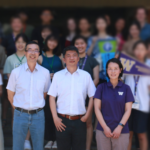 Authors:
Authors:
- Yen-Chu Weng, she/her, Lecturer Part-Time, Program on the Environment, University of Washington, Seattle campus
- Po-Yi Hung, he/him, Program Co-Director, Affiliate Professor of Jackson School of International Studies and Professor of Geography at National Taiwan University, University of Washington, Seattle campus
Project Description
The Program on the Environmental (PoE) Taiwan Study Abroad Program introduced topics of environmental and social resilience to UW students in a cross-cultural context. During the month-long program in Taiwan, students explore the themes of eco-city, food and society, renewable energy, community revitalization, eco-tourism, and aboriginal communities. Students traveled to three main locations in Taiwan and had local students join class activities during the entire program. Through lessons from local experts, site visits, field trips, and project-based learning, students gained both content knowledge and a deeper understanding of how local communities worked together to promote resilience in these various aspects.
A major pedagogical goal of this study abroad program was cross-cultural learning and reflection. Both the UW and Taiwanese students had the opportunity to learn together and share their experiences and perspectives with each other.
The PoE Taiwan Study Abroad Program was a month-long program in the Summer A term. Major challenges of a short-term intensive study abroad program include: (1) how to facilitate the ice breaking process, (2) how to design learning activities that promote the mingling of students from both campuses and that are inclusive, and (3) how to design a meaningful final project that is feasible and can foster cross-cultural reflection.
In addition, students coauthored a weblog documenting their study abroad experience and more information can be found on the program website: https://sites.google.com/view/uw-poe-taiwan-2023/blogs
Project Question
At the UW, study abroad programs consist of a small group of students with diverse backgrounds, who may not have knowledge of the foreign country they will visit. How to prepare students for a month-long immersive experience, how to facilitate genuine cross-cultural learning, and how to ensure students from both the UW and the host country feel equally empowered are major challenges we anticipated and hoped to address proactively through the design of our study abroad program.
Context
The PoE Taiwan Study Abroad Program in 2023 had 18 undergraduate students with different majors ranging from freshmen to seniors. Two courses “Environmental and Social Resilience” and “Food and Society” were offered. The course activities included lectures, site visits, field trips, and project-based learning. The host institution National Taiwan University had a parallel course and students from both the UW and Taiwan attended all activities together and collaborated on the final presentations.
Methods
We will share three strategies and lessons learned:
- Having a central Google site: A study abroad program involves many moving parts: schedule, assignments, student contacts, lodging, and transportation. A Google site was built as the central platform for sharing all program information and materials.
- Partnering with local universities: Having peers in the same age group helped the UW students better immerse themselves in local culture and exchange experiences in both formal and informal settings.
- Non-traditional assessments: Students collaborated on lightning talk presentations and co-authored a blog to reflect on their study abroad program using images and multi-media to share their own stories in a cross-cultural context.
Impact/Assessment
The PoE Taiwan study abroad program included assessments in two categories: (1) public-facing: story maps, blog entries, group lightning talks, and (2) individual: participation, weekly journals, and a short video reflection. The former set of assessments provided students with the opportunity to document their journey together with texts, photos, and videos. The latter set of assessments were personal through which students reflected on their learning experiences and connected to the course themes.
In this intensive program, all students were able to keep up with the pace of their learning. Students reported that the recurring structure of the weekly assignments allowed them to follow along. Students enjoyed the non-traditional assignments. Students were creative in using photos and videos to share their reflections. Lightning talks were also image-based and required less research and writing, making them a feasible option for a quick turnaround group project.
The program Google site was a success. Students constantly referred to the website for the schedule and program information. The website now serves as a depository of all course materials and can be easily shared with anyone interested in this program. The UW students met 30 Taiwanese students who served as their local hosts. Outside the class time, students from different countries share their experience with pop culture, student life, food, and hobbies, providing the UW students with a more holistic experience of Taiwan.
Application
Our study abroad program is relevant to three types of instructional context: study abroad programs, experiential learning, cross-cultural competency/international studies. The UW offers about 80 faculty-led study abroad programs each year. Our program provides a model for how other faculty members might structure their program to better manage the program logistics and the partnership with foreign institutions. The courses included in our program focused on experiential learning with a great proportion of site visits and field trips. Non-traditional assessments were included to better facilitate student learning and provide students with the opportunity to demonstrate their learning in multi-model formats. Faculty who teach cross-cultural competency and international studies, with or without the study abroad experience, can learn how to design learning activities that promote cross-cultural communication and reflection.